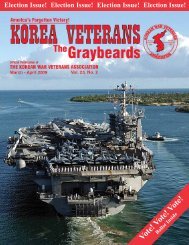Sep/Oct 2005 - Korean War Veterans Association
Sep/Oct 2005 - Korean War Veterans Association
Sep/Oct 2005 - Korean War Veterans Association
You also want an ePaper? Increase the reach of your titles
YUMPU automatically turns print PDFs into web optimized ePapers that Google loves.
26<br />
Old Letters Stir Up Memories<br />
We have received a few old letters recently. The writers share<br />
one common connection: letters and memories. Let’s share a<br />
couple letters.<br />
On Defense<br />
By Daniel R. Beirne<br />
In World <strong>War</strong> II, the army spent most of the time in offensive<br />
action. In Korea, however, the army experienced most of the<br />
first year’s action on the defense. As a member of K Company,<br />
5th RCT, I remember the many times spent as rear guard for the<br />
withdrawing American Eighth Army. In a letter to my family on<br />
9 December, 1950, I wrote:<br />
After we received a fierce night attack by the Chinese north<br />
of Pakchon and had fifty casualties, we withdrew in the middle<br />
of the night to a defensive position just north of the Chongchon<br />
River. The 3rd Battalion took the west bridge, while 2nd<br />
Battalion took the one on the east.<br />
Company K stood on the west bridge as two ROK divisions<br />
and most of the U.S. 24th Division passed. On the other bridge,<br />
most of the U.S. 2nd and 25th Divisions withdrew. Long convoys<br />
of trucks and tanks passed through us, all headed south. We<br />
seemed destined to possibly be cut off and left behind. At the<br />
end came elements of the United States Second Division which<br />
had been overrun by the Chinese at Kunu-ri. Many artillery units<br />
had lost their guns which had been left behind.<br />
The trucks were full of shivering men, trying to keep warm at<br />
minus 10 degrees. Many in the ROK units, especially officers,<br />
were afraid of reprisals by the North <strong>Korean</strong>s. After everyone<br />
had crossed, and the Chinese had not appeared, we still waited<br />
for hours for orders to blow the bridges and withdraw to the rear.<br />
We waited for a day and a night. Morale became very low.<br />
Everyone was fearful of being cut off. Tension was terrific.<br />
Finally, the bridge was blown, and we<br />
withdrew to high ground in Anju. All<br />
around us were thousands of refugees who<br />
were trying to get across the river. Many<br />
had waded into the icy water and crossed at<br />
the shoulder deep fords. On both sides of<br />
the river, lights flickered from fires as these<br />
refugees tried to dry out their clothes and<br />
keep warm.<br />
When we got to Anju, we were told to<br />
go into a defensive position. The men had<br />
not eaten for twenty-four hours. Our<br />
kitchens had moved thirty miles to the<br />
south. Our bedrolls had been moved with<br />
the kitchens. We hadn’t slept for three<br />
days. Finally, after another day, our trucks<br />
arrived to take us south. We climbed into<br />
the trucks and took a cold night ride to the<br />
rear where we finally found a hot meal and<br />
a warm place to sleep.<br />
Col. Beirne can be reached at 5818<br />
Meadowood Road, Baltimore, MD 21212.<br />
When Cardinal Spellman Visited Korea<br />
When Francis Cardinal Spellman, Archbishop of New York,<br />
visited Korea in 1952, he was kind enough to send a note to<br />
George Kinne’s mother. He wrote:<br />
CARDINAL’S RESIDENCE<br />
452 Madison Avenue<br />
New York 22, N.Y.<br />
February 20, 1952<br />
Dear Friend:<br />
You will be pleased to know that during my recent trip to Korea,<br />
Japan and other places in the Far East, I had the privilege and pleasure<br />
of meeting your dear one from whom I am happy to bring affectionate<br />
and and prayerful greetings with the hope that before a very<br />
long time has elapsed, your loved one will be able to greet you personally.<br />
At the time we met, he was doing well, was in good spirits,<br />
and very courageous in facing the problems that confront him and<br />
bravely bearing the burdens of a serviceman’s life.<br />
Begging God’s blessing on you and all those dear to you, I am<br />
Prayerfully,<br />
Francis Cardinal Spellman<br />
Archbishop of New York<br />
Mrs. George Kinne<br />
Box 214 – Rural Free Delivery #2<br />
Monticello New York<br />
Kinne, who served in Korea from February 4, 1951 to<br />
November 25, 1952 , provided several photos to document his<br />
experience.<br />
George W. Kinne, 1812 Harrodsburg Rd,<br />
Lawrenceburg, KY 40342-9238<br />
Cardinal Spellman celebrating mass in Korea, 1951<br />
<strong>Sep</strong>tember - <strong>Oct</strong>ober <strong>2005</strong><br />
The Graybeards
















